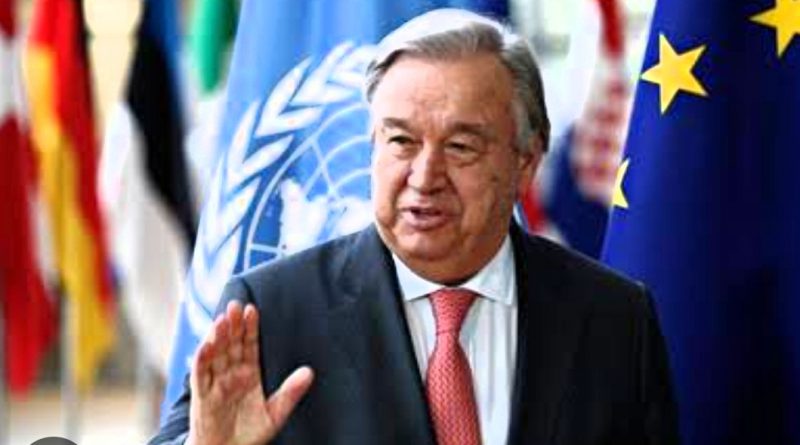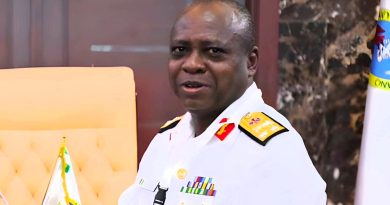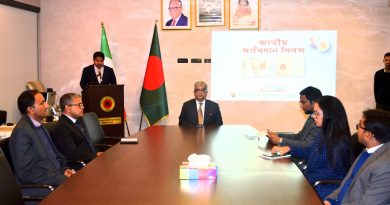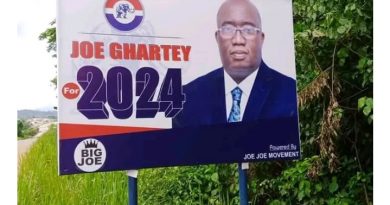UN SECRETARY-GENERAL’S REMARKS TO THE PRESS- FULL TEXT
UN SECRETARY-GENERAL’S
REMARKS TO THE PRESS
Nairobi, 3 May 2023
Ladies and gentlemen of the media,
It is good to be back in Nairobi and I thank the Kenyan government and people for their warm welcome.
The Chief Executives of the UN system are gathering here for an important meeting. This is yet another demonstration of Kenya’s vital place regionally and globally.
And this is a vital time, as we look at the unfolding crises in the region, especially in Sudan — a situation that is deeply concerning as it grows worse by the day.
Khartoum is in turmoil; Darfur is burning once again; and the UN Refugee Agency is warning that more than 800,000 people could flee the country in the coming days and weeks.
The fighting needs to stop — now — before more people die and this conflict explodes into an all-out war that could affect the region for years to come.
All parties must put the interests of the Sudanese people first — that means peace, prosperity and a return to civilian rule.
We are putting these goals front and centre as we engage with the parties to the conflict, and work hand-in-hand with the African Union and the Intergovernmental Authority on Development.
The Sudanese are facing a humanitarian catastrophe. Hospitals destroyed.
Humanitarian warehouses looted.
Millions facing food insecurity.
I echo President William Ruto’s strong calls for the parties to de-escalate tensions, return to the negotiating table, and agree on a lasting ceasefire.
In the meantime, the United Nations is ready to deliver for the Sudanese people, under the leadership of my Special Representative Volker Perthes.
The Emergency Relief Coordinator Martin Griffiths, is now in Sudan to help ensure the continued flow of humanitarian assistance.
Aid must be allowed into Sudan, and we need secure and immediate access to be able to distribute it to people who need it most.
Civilians and civilian infrastructure must be protected. And humanitarian workers and assets must be respected.
I call on the international community to support the Sudanese people in their pursuit of peace and a return to the democratic transition.
Ladies and gentlemen,
Africa is a place of enormous natural, human, cultural and entrepreneurial richness.
The African Union is a close and valued partner of the United Nations — from peacebuilding and peacekeeping, to our joint efforts to deliver Agenda 2063 and the 2030 Agenda.
The recent ceasefire in Libya and the peace agreement in the Central African Republic are a cause for optimism.
I salute Kenya’s leadership role in the peace processes in the Democratic Republic of Congo and Ethiopia.
Last month, I visited Somalia where I saw important progress in the fight against terrorism — bolstered by the African Union Transition Mission there.
And on Saturday, I will attend in Burundi the meeting of the Regional Oversight Mechanism to discuss peace and security in the DRC and the region.
Step by step, we are seeing African leadership working to solve African problems. Ladies and gentlemen,
The 21st century should be Africa’s century.
But a series of historic and economic injustices stand in the way.
The COVID-19 pandemic slowed and even reversed strong economic growth across the continent.
The global cost-of-living crisis, made worse by the Russian invasion of Ukraine, has sent food and energy prices soaring.
Climate chaos — that Africans did very little to cause — is creating floods, hunger and deadly droughts.
And the dysfunctional and unjust global financial system denies many African countries the debt relief and concessional financing they need.
Africa is doubly victimized.
First, by the scars of colonialism that linger to this day.
Second, by the injustice of the post-World War Two era, when global institutions — from the United Nations to the International Monetary Fund and the World Bank — were created. At the time, the decolonization of Africa had yet to get underway and so, African countries were practically not present and, to this day, remain clearly under-represented.
The same applies to correct one of the biggest injustices in the international peace and security architecture – the absence of a permanent seat on the Security Council for the African continent.
This must be remedied.
Ladies and Gentlemen,
I’ve made it my mission to stand with developing countries in their pursuit of justice. First — financial justice.
This is an absurdity.
We need deep reforms to the global financial system so that Africa is represented at the highest level, and the needs of developing countries are at the heart of all policies and decisions.
Last year, the International Monetary Fund allocated 650 billion dollars in Special Drawing
Rights — or SDRs — to boost liquidity during crises.
The countries of the European Union received a total of 160 billion dollars in SDRs, while
African countries — with three times the population — received just 34 billion dollars.
And I’ve called for an SDG Stimulus of at least $500-billion per year to scale-up affordable, long-term financing for developing countries.
Second — climate justice.
African countries are leading the way on climate.
I commend President Ruto’s commitment to transition to 100 per cent clean energy by 2030; South Africa’s Just Transition Energy Partnership; Egypt and Nigeria’s energy transition plans; and the AU’s ambitious Green Stimulus Programme.
These massive efforts need massive support.
Developed countries must deliver on the $100-billion a year promise to developing countries and the loss and damage fund agreed in Sharm el-Sheikh.
I have proposed a Climate Solidarity Pact in which developed countries provide financial and technical support to help emerging economies — in Africa and beyond — promote the transition to renewable energy.
Third — Africa needs the justice that only peace can bring.
The United Nations will continue working to prevent and defuse the conflicts that plague the continent.
I have called consistently for a new generation of robust peace-enforcement missions and counter-terrorism operations, led by the African Union with a UN Security Council mandate under Chapter VIII of the Charter, with guaranteed funding, namely through assessed contribution.
Ladies and gentlemen,
Once again, I am pleased to be back in Kenya.
The United Nations stands with Africa.
I will not relent in the quest for peace, prosperity, and global justice for all the people of this great continent.
Thank you.
Photo Credit: Shutter Stock




